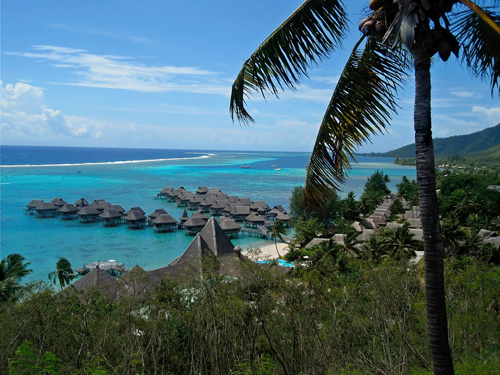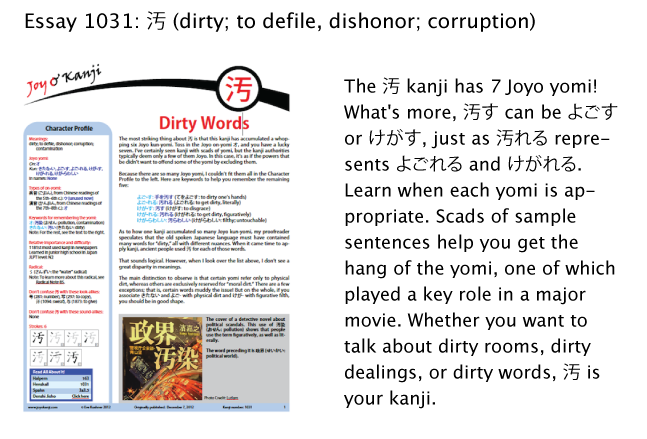Hidden by Hiragana
On someone's kanji blog this week, a commenter (purportedly a Japanese man) sneered at the way kanji learners "overuse" the characters. In his view, enthusiasts tend to use kanji for words that the Japanese would render in hiragana.
This distressed me on several levels.
First, why squash enthusiasm about anything, particularly about kanji learning?
Second, why introduce toxicity into anyone's blog, especially one with an upbeat, fun approach to kanji? (For that matter, why be nasty to anyone at all? I know it's unavoidable sometimes, but this was not one of those cases!)
Third, is it truly harmful to "overuse" kanji? Doing so may not mimic the way Japanese would write, but does it actually matter? Extra exposure to the characters might help.
In Joy o' Kanji essays I sometimes alter sample sentences to include more kanji than a native speaker would. I do so when the kanji clarifies a meaning that the hiragana has hidden.
I've been led astray by hiragana time and again. Here are a few examples.
1. Some People
Consider this sentence, which a Japanese friend wrote in an email:
ある人は同じ言葉で傷ついたりまったくなんとも思わなかったりします。
Some people are wounded by words that don't bother other people at all.
人 (ひと: people); 同じ (おなじ: same); 言葉 (ことば: words);
傷つく (きずつく: to be wounded); まったく ... ない (not ... at all);
なんとも (not at all); 思う (おもう: to feel)
With phrases such as ある人, I've long thought that the ある corresponded to 有る (to have). I never knew why ある could suddenly refer to people, given that the Japanese mainly use いる for that.
However, I've recently realized that the ある in ある人 corresponds to 或る (which contains a non-Joyo kanji). This word means "some." Ah! That makes more sense.
2. A River of Hiragana
The first long stretch of hiragana in the next sentence threw me for a loop.
多くの川は汚染がひどいのでもはや飲料水を取るために利用することはできない。
Many rivers have been so polluted that they can no longer be used for drinking water.
How would you break up がひどいのでもはや? I'll give you a moment.

Photo Credit: Eve Kushner
With this depressing talk of polluted rivers, I thought you might enjoy a reminder that some places in the world are still untouched. This is Moorea, an island near Tahiti.
When I saw that phrase, I thought it might be が + ひどい + ので + も + はや. Or maybe の + でも for the middle part. I found in the dictionary that はや can correspond to 早 (already, now, by this time), which seemed to fit the sentence well enough.
No! My proofreader identified the word in question as もはや (最早: no longer).
The final vocabulary list looks like this:
多くの川は汚染がひどいのでもはや飲料水を取るために利用することはできない。
Many rivers have been so polluted that they can no longer be used for drinking water.
多い (おおい: many); 川 (かわ: river); 汚染 (おせん: pollution); ひどい (horrible);
もはや (最早: no longer); 飲料水 (いんりょうすい: drinking water); 取る (とる: to take); 利用 (りよう: use)
3. Replacement Parts
One more hiragana challenge. When I tried to define the vocabulary for the next sentence, I found myself tripped up by にとってかわる:
空気汚染の問題があるので、自転車が自動車にとってかわる日が来るかもしれない。
Because of air pollution, the bicycle may someday replace the automobile.
I did it this way:
にとって (as far as); かわる (代わる: to replace)
No! According to my proofreader, this is correct:
に (particle) + 取って代わる (to take the place of something or somebody)
If anything should take the place of anything, it's clearly kanji that should replace hiragana as often as possible!
Here's the vocabulary list for that sentence:
空気汚染の問題があるので、自転車が自動車にとってかわる日が来るかもしれない。
Because of air pollution, the bicycle may someday replace the automobile.
空気汚染 (くうきおせん: air pollution); 問題 (もんだい: problem); 自転車 (じてんしゃ: bicycle);
自動車 (じどうしゃ: car); 取って代わる (とってかわる: to take the place of); 日 (ひ: day); 来る (くる: to come)
The last two sample sentences came from essay 1031 on 汚 (dirt), newly published today. Here's a preview:

Have a great weekend! Be sure to use as much kanji as possible!

Comments